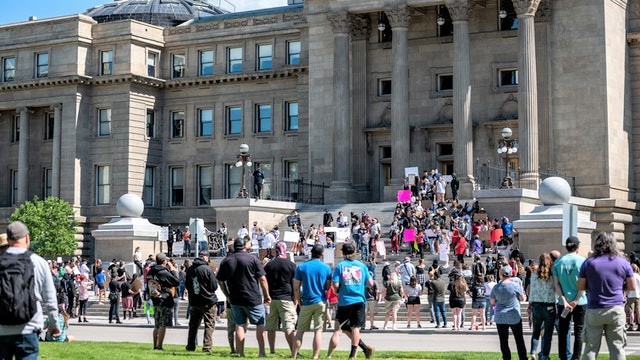
Democracy in modern society is usually generalized as the amalgamation of conventional democracies. Some political scientists consider it as the continuity of conventional democracies. On the other hand, some political experts relate the factor of modernization in the process of democracy and democratization. It is a bit of a debatable conversation to some extent. But one can not ignore the impact of modern society on the process of democratization.
The process of democracy in modern society can be related to political institutions. A vibrant democracy ensures the protection of individuals’ rights. It paves the way for individuals to undertake responsibilities and other obligations assigned by the state. It sheds a trickle-down effect on society. The structure of society is based on Individuals. In a democracy, every citizen of the state is should perform its obligations and responsibilities. This not only strengthens the society but also supports the state in its functionality.
What Is Democracy?
Democracy, which stands for government by the people, is the rule of the people, according to the principle of sovereignty of the people. People can make possible their own representation if they like. They reserve the right to choose their representative themselves. People can work together to make laws. These laws govern their society and decide for themselves what to do about it. They reserve the right to choose their representative themselves.
Democracy contains a general right to elect representatives to make laws that reflect people’s will and desires. To achieve democracy, citizens in a country have to do their part to participate in government. Such participation means making contributions of time and money and exercising the democratic right to vote, in elections.
The Benefits of a Modern Democracy
Underlying all of these benefits is a vision of political participation that minimizes conflicts and promotes problem-solving. A democracy allows its citizens to take part in governance and influence decision-making in all manner of spheres. Civic responsibility has become part of every citizen’s moral and spiritual heritage.
A major goal of a government in a democratic society is to facilitate this participation. It ensures that all people are equal before the law. A constitution is created so that it operates with the general welfare as its guide, thus establishing the structure of the government as a whole.
How Does Modern Democracy Work?
Antonio Gramsci has well summarized the difference between traditional and modern democracy.
The formal features of democracy imply the existence of two opposite elements. One which is more formal and takes the form of a general will of the people. And the other is more deeply grounded in a specific historical context and a particular situation of historical development. The latter element, of which the principal form is centralization, assumes the formal nature of democracy and regards developed industrial capitalism as the basic contradiction, as the enemy of liberty. Because it is the central contradiction, the fundamental one and its lack is the cause of the entire situation. Solid measures can make it possible to stop such a situation.
Limitations of a Modern Democracy
There are many important aspects of modern democracy to consider. For example the scope of the electorate, the tolerance of different views, the extent to which the system is open and allows room for questioning, and the question of tolerance for minorities. All of these aspects have been very relevant to American politics during the 20th century.
A great example of the heavyweight of the question of pluralism, tolerance, and critical thinking in modern American democracy is the idea of separation of church and state. This concept was first put into play in the Maryland Constitution of 1776. It also contained many other Enlightenment principles and was upheld by the Supreme Court in 1954.
Limitations of Democracies in Developing Countries and Authoritarian Regimes
On the other hand, while a democratic regime can guarantee the rights of its people. It is almost impossible to develop a functional democracy if an authoritarian regime exists. The authoritarian regime presents obstacles to public participation in the affairs of the state and promotes the interests of political elites that oppress and exploit the common people.
As a general rule, the most authoritarian regimes are marked by a clear separation. This separation is between public and private affairs, the lack of freedom of association, political prisoners, rampant corruption, and authoritarian and cronyism governance.
Limitations of Western Democracies to Combat Inequality and Climate Change
There are also some hindrances to democracy in modern society. Most countries in the West, while leaning toward democratic governments, still have some serious shortcomings in terms of rights for the poor and the most disadvantaged and far-reaching climate change impacts. Consider the US, where climate change and inequality have become increasingly alarming. The social sciences of the 19th and early 20th centuries provided the intellectual basis for early 20th-century thinkers like John Maynard Keynes and others to advocate what they called “helicopter welfare economics” (Shumway and Seitz, 2009, ch.4).
Why We Need to Improve the Democratic Processes Now More Than Ever
According to the latest Organization for Economic Co-operation and Development (OECD) World Economic Outlook report, while global GDP grew by 5.1% from 2007-2016, inequality increased. In other words, not only has our income inequality not decreased since 1980, it has also increased. The gap between rich and poor is growing in more and more parts of the world.
According to the International Labor Organization (ILO), 83% of the jobs in the world will be created in developing and emerging economies by 2030. As I said earlier, the right to strike by workers would be a welcome development, except for the fact that these rights only work if their unions are independent and strong enough to fight for and defend them.
Conclusion
In his examination of contemporary politics, Hegel identified many current problems and problems that will persist in the future, including the existence of dichotomies in politics. In his discussion of democracy, Hegel identified the reality of the political problem. This problem lies between virtue and vice, or opposites where the two are seen as mutually exclusive.
The first thing that Hegel saw was that the temptation to have one’s politics conform to law and order is very strong, which leads to a dichotomy between order and freedom. Therefore, man has the choice between the order of ‘civilization’ and the freedom to follow one’s will freely and by will, or will and force.




Pingback: Which is Better - Democracy or Bureaucracy? - Siasi Yateem
Pingback: What Is a Civilian Dictatorship? Does It Happen? - Siasi Yateem